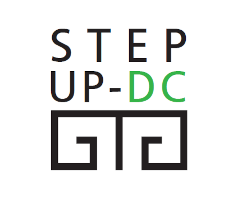Session 2, Education for democratic citizenship and democratic culture
STEPUP-DC Project

Course DescriptionBasic Topics
- Citizenship
- Citizenship education
- Civic duty
- Democracy
- Constitution
- Rule of law
- Authoritarianism
- Patriotism
- Nativism
Duration
The duration of the session is 9 hours (3 reading + 3 learning + 3 working/practicing)Objectives
The Objectives of this session are:
- Support students in developing in-depth, critical understanding of the role of education and particularly of formal education in the development of children’s / young citizens’ political socialisation.
- Guide students in developing in-depth, critical understanding of current challenges in the area of democracy and the role of Education for Democratic Citizenship (EDC), Human Rights Education (HRE) and Intercultural Education (IE).
- Develop students’ confidence in leading initiatives and developing educational programmes on EDC/HRE/IE.
- Familiarise students with key tools on EDC/HRE including the Council of Europe’s Charter on EDC-HRE and the EDC-HRE teaching resource series.
Learning outcomes
After completion of the session students will:
- Have a clear understanding of the different types of citizens and educational strategies that promote them;
- Be aware of challenges to democracy and ways that learning in the classroom, school-wide and the community can promote CDCs that address these;
- Reflect on the aforementioned in developing methods for their own classrooms that promote the development of competences for democratic culture.
Outcomes and CDC
- Knowledge and critical understanding
- Including politics, law, human rights, cultures, religion, etc.
- 117: Can explain the meaning of basic political concepts, including democracy, freedom, citizenship, rights and responsibilities (basic)
- 124: Can reflect critically on the relationship between human rights, democracy, peace and security in a globalised world (intermediate)
- 130: Can describe the diverse ways in which citizens can influence policy (advanced)
- 108: Can reflect critically on his/her own values and beliefs (intermediate)
- Values
- Valuing democracy, justice, fairness, equality and the rule of law
- 301: Argues that schools should teach students about democracy and how to act as a democratic citizen (basic)
- 303: Argues that laws should always be fairly applied and enforced (basic)
- 308: Argues that democracy should always be protected and respected as an essential foundation for acting together with others in society (intermediate)
- 312: Expresses the view that all people and institutions should be subject to and accountable to the law (intermediate/advanced)
- 313: Expresses the view that there should be a transparent legal system, including a clear set of laws that are freely and easily accessible to all (intermediate/advanced)
- 316: Expresses the view that law-making should be controlled by persons who have been elected by and are accountable to the people (intermediate/advanced)
- 321: Expresses the view that the legal system should have fair and transparent enforcement structures and procedures (advanced)
- Attitudes
- Civic Mindedness
- 607: Expresses an interest in public affairs and issues (intermediate)
- 609: Expresses acceptance of the obligations of belonging to a community (intermediate)
- 610: Expresses commitment to sustaining and safeguarding the human rights of other people (intermediate)
- Citizenship
- Citizenship education
- Civic duty
- Democracy
- Constitution
- Rule of law
- Authoritarianism
- Patriotism
- Nativism
The Objectives of this session are:
- Support students in developing in-depth, critical understanding of the role of education and particularly of formal education in the development of children’s / young citizens’ political socialisation.
- Guide students in developing in-depth, critical understanding of current challenges in the area of democracy and the role of Education for Democratic Citizenship (EDC), Human Rights Education (HRE) and Intercultural Education (IE).
- Develop students’ confidence in leading initiatives and developing educational programmes on EDC/HRE/IE.
- Familiarise students with key tools on EDC/HRE including the Council of Europe’s Charter on EDC-HRE and the EDC-HRE teaching resource series.
After completion of the session students will:
- Have a clear understanding of the different types of citizens and educational strategies that promote them;
- Be aware of challenges to democracy and ways that learning in the classroom, school-wide and the community can promote CDCs that address these;
- Reflect on the aforementioned in developing methods for their own classrooms that promote the development of competences for democratic culture.
- Knowledge and critical understanding
- Including politics, law, human rights, cultures, religion, etc.
- 117: Can explain the meaning of basic political concepts, including democracy, freedom, citizenship, rights and responsibilities (basic)
- 124: Can reflect critically on the relationship between human rights, democracy, peace and security in a globalised world (intermediate)
- 130: Can describe the diverse ways in which citizens can influence policy (advanced)
- 108: Can reflect critically on his/her own values and beliefs (intermediate)
- Including politics, law, human rights, cultures, religion, etc.
- Values
- Valuing democracy, justice, fairness, equality and the rule of law
- 301: Argues that schools should teach students about democracy and how to act as a democratic citizen (basic)
- 303: Argues that laws should always be fairly applied and enforced (basic)
- 308: Argues that democracy should always be protected and respected as an essential foundation for acting together with others in society (intermediate)
- 312: Expresses the view that all people and institutions should be subject to and accountable to the law (intermediate/advanced)
- 313: Expresses the view that there should be a transparent legal system, including a clear set of laws that are freely and easily accessible to all (intermediate/advanced)
- 316: Expresses the view that law-making should be controlled by persons who have been elected by and are accountable to the people (intermediate/advanced)
- 321: Expresses the view that the legal system should have fair and transparent enforcement structures and procedures (advanced)
- Valuing democracy, justice, fairness, equality and the rule of law
- Attitudes
- Civic Mindedness
- 607: Expresses an interest in public affairs and issues (intermediate)
- 609: Expresses acceptance of the obligations of belonging to a community (intermediate)
- 610: Expresses commitment to sustaining and safeguarding the human rights of other people (intermediate)
- Civic Mindedness
A series of resources that the student teacher must study in this session and a series of additional resources for further study.
A full paper and additional e-lessons on the topics of the session and additional interactive presentation of the materials, for the student teachers to study all the materials in a row.
A series of authentic, up to date and relevant activities with their accompanying materials, which deliver the intended learning outcomes of the session and are carried out face to face or E-learning with groups of student teachers
Several types of questions to evaluate how much the student teachers have learned throughout the session (reading material, learning material and workshop)
